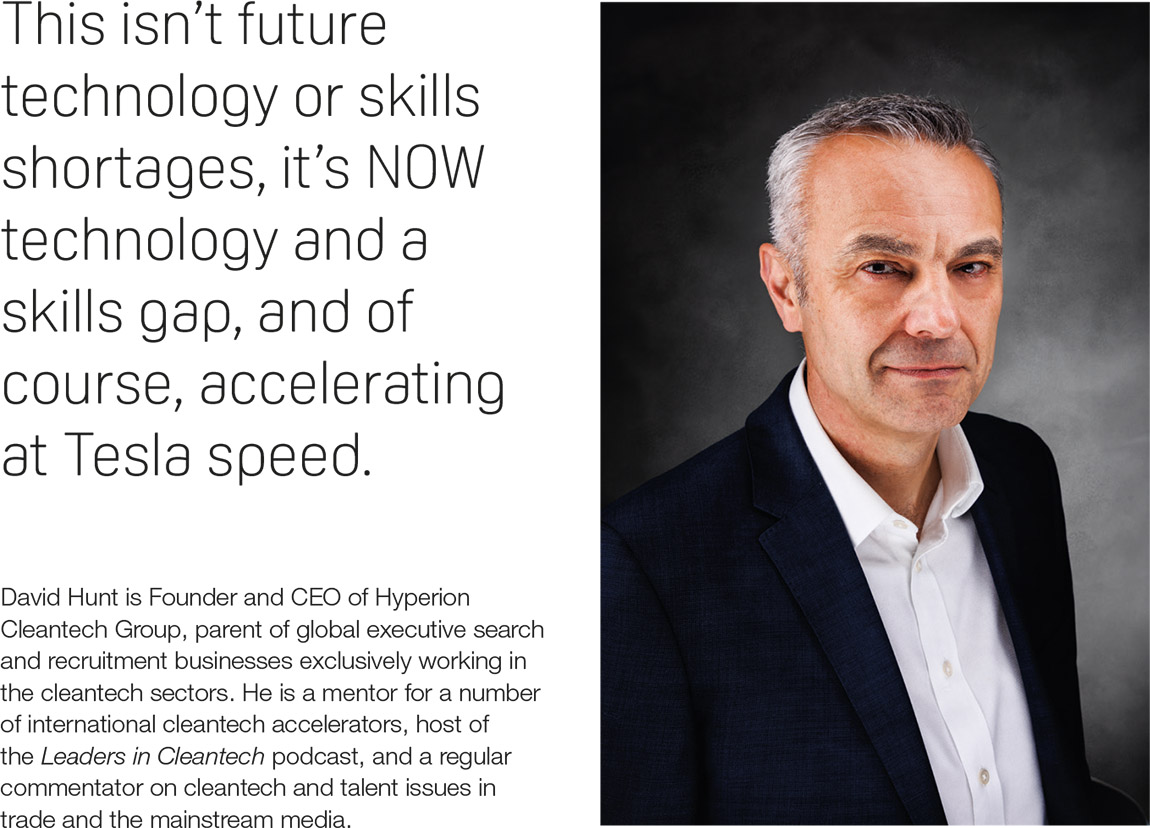David Hunt on the cleantech skills gap and how to enter the industry
BY DAVID HUNT

As both the clean energy and clean mobility transitions are increasingly going through rapid digitalisation, skills in computer science and engineering, are and will be in high demand. Photo: dreamstime.com
As a self-confessed cleantech nerd, I was delighted to see the launch of Discover CleanTech magazine, and even more so when asked to contribute a regular column. I’ve had the pleasure of working in the cleantech sector since 2007, launching a solar business way before subsidy support and Feed in Tariffs. I rode the ‘solar-coaster’ of UK solar/energy policy, sat on the policy board for the Renewable Energy Association (REA) and really enjoyed building a pioneering, nationwide, multi-award-winning renewable energy company. We designed and installed all of the clean technologies on Armstrong Point, the UKs first net-zero energy business park. Most memorably, though, was a solar and wind installation that involved Bear Grylls, a boat and an outdoor toilet. Maybe more of that another time (or it may come up in a Google search!).
Having fallen in love with cleantech and all that can be achieved with new, innovative and sustainable technologies, I wanted to find a way I could help more technologies, and more companies in the sector to grow. I returned to my earlier career in executive search (headhunting) and founded Hyperion Executive Search, to work exclusively in cleantech. Eight years later, we have teams in the UK, Germany and the US, and have helped some of the world’s most innovative cleantech companies to grow and scale.
These days I spend much of my time mentoring and supporting cleantech companies and their founders as an Entrepreneur in Residence (EiR), mentor and speaker for some of the world’s leading cleantech accelerators, such as Plug & Play, Techstars, Rockstart and Foresight Canada. I also host the Leaders in Cleantech podcast, ranked in the top one per cent of podcasts globally. This just goes to show the interest in the topic area. Clean technologies are changing the world for the better as we speak.
All of these things lead me to my core passion, the intersection of cleantech, entrepreneurialism, leadership and talent. As you would perhaps expect, I firmly believe that no business or technology can succeed without talented and committed people at the heart of things. In this publication, we have been exploring the role of educational establishments and government in pathing the way for the green jobs of the future. It is easy to criticise both for their slowness in making qualifications and career guidance fit for this new economy. The big issue is that traditional academia and government work slowly and cautiously. The cleantech sector, though, is moving at breakneck speed, and most of this growth and innovation is coming from start-ups, not large corporates, so agility and risk are central to this. There is a disconnect that isn’t easily solved. One thing is for sure, though; there is a talent shortage at all levels, and in all disciplines. It is not just in engineering and software development, and it’s from leadership to entry level. The lack of talent is already holding back companies in the sector, and therefore the growth of the sector as a whole. We need to educate the educators, show them the levels of investment and growth in the sector. This isn’t future technology or skills shortages, it’s NOW technology and a skills gap, and of course, accelerating at Tesla speed .
The skills in demand
One trouble I’ve found is that unless you are ‘in’ the cleantech sector it’s hard to see the scale of growth. You can look at statistics; in the EU last year, for example, over 11 billion euros was invested in cleantech companies, plus significant amounts in the UK, but if you talk to the average person on the street, they have no idea beyond maybe seeing some solar panels on the odd roof, and an increasing number of electric vehicles on the road. That’s why I think publications like this are so important.
I’m often asked what skills are most in demand, or what people should encourage their children to study at University. As mentioned before, the shortages are across all disciplines. That said, as both the clean energy and clean mobility transitions are increasingly going through rapid digitalisation, skills in computer science and engineering, particularly electrical engineering, are and will always be in high demand. Of course, not everyone wants to be, or has the skills to be an engineer or software developer. The good news is that most skill sets can be utilised in the clean technology sector. I’ve always found that universities are really poor at career advice and preparing their students for employment. This is even from traditional courses, let alone those geared towards the new technologies. It’s critical that universities engage more with industry, with trade associations, even with specialist recruiters, to hear what employers are looking for beyond qualifications. And just as importantly, so they can prepare and signpost their students, enabling them to make better choices.
How you can move into the cleantech sector
It’s far from just an issue for those new to the job market, it can also be difficult for those in employment but who are increasingly frustrated and wanting to do something more impactful with their skills and their time; something more in line with their interests and passions. Most skills are transferable, but how do you know that, and how can you show it? This is also something I’m asked often and have blogged about in the past. I also created an independent, not for profit platform called ‘Careers in Cleantech’, to share insights and stories of those making the transition into the sector, and to answer any questions people have. The platform is visible on Linked In, Twitter and YouTube. The proof in point is that it is individuals and small companies trying to fill a void that governments should really be supporting.
The other areas I’m asked about is which sub-sectors of cleantech are ‘hot’ from a careers point of view, or just from an exciting growth point of view. The two go hand in hand. At present, anything to do with batteries, at all scales, and the electrification of transport, of all types, are seeing massive growth and investment. It perhaps surprises many that it’s not just cars and buses that are increasingly battery powered, but boats, ferries and even small aircraft are already with us.
I look forward to sharing more news, views and insights from the global cleantech sector in the coming weeks and months.

Subscribe to Our Newsletter
Receive our monthly newsletter by email





